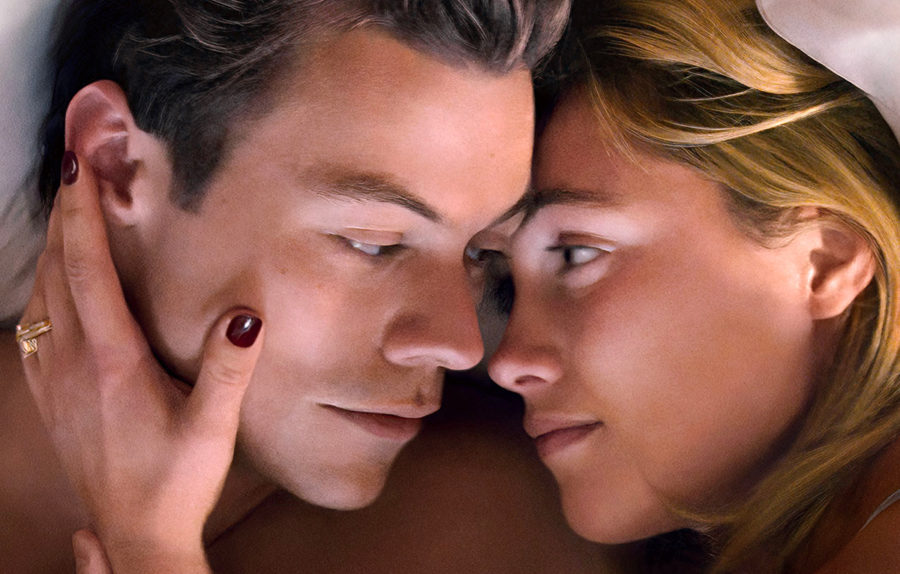Should We Be Worried, Darling?
A deep dive into the controversies of director Olivia Wilde’s new film, “Don’t Worry Darling”
Courtesy of Warner Bros. Pictures
Harry Styles (left) and Florence Pugh (right) play Jack and Alice Chambers, a husband and wife living in a 1950s utopian experimental community that’s hiding a dark secret.
September 16, 2022
If you’ve been on Twitter at all within the past week, you’re likely to have seen some sort of meme related to the drama surrounding the cast of director Olivia Wilde’s new film, “Don’t Worry Darling.” Of course, there are some silly rumors floating around, like Harry Styles “spitting” on co-star Chris Pine at the Venice Film Festival—when really, Pine was just looking down at the pair of glasses in his lap as Styles took his seat. But there is also quite a bit of real tension between Wilde and the star of the film, Florence Pugh, as well as some negative public reactions to the film itself and Wilde’s overall unprofessionalism.
Last month, fans started to notice that Pugh was not promoting “Don’t Worry Darling” on her social media as she does with the other films that she stars in. Thus, people started to speculate as to why she would not be posting the trailers or resharing the Instagram posts that Wilde was making about Pugh and the rest of the cast.
Then, in a mid-August interview with Harper’s Bazaar, Pugh expressed her disdain for the director’s emphasis on the sex scenes between her and Styles—specifically the depictions of female pleasure—both in the trailer and in her general discussion of the film in interviews. Pugh stated, “When it’s reduced to your sex scenes, or to watch the most famous man in the world go down on someone, it’s not why we do it. It’s not why I’m in this industry… That’s just not what I’m going to be discussing because [this movie is] bigger and better than that. And the people who made it are bigger and better than that.” The film itself is primarily about Pugh’s character, Alice, breaking out of the ’50s housewife mold in order to uncover the potential wrongdoings of the company that owns her idyllic utopian community called the Victory Project. Reducing the movie to some sort of pornographic empowerment message seems incredibly strange and, honestly, sort of disappointing to me considering the themes of the film.
However, this is just one small piece of the puzzle that is the “Don’t Worry Darling” controversy; there seems to be even more tension between Pugh and Wilde due to casting choices. Styles’ character, Jack, was originally supposed to be played by actor Shia LaBeouf. Wilde claims that she fired LaBeouf in 2020 because of his aggressive “process,” and that she needed him off of the film in order to “protect” the other actors. However, LaBeouf confirmed last month that he had actually quit the film because he felt that the actors were not given enough time to rehearse the script. What worsens the fact that Wilde made these false claims was the evidence that LaBeouf provided: in a video that Wilde had sent him, she states, “I feel like I’m not ready to give up on this yet… You know, I think this might be a bit of a wake-up call for Miss Flo, and I want to know if you’re open to giving this a shot with me, with us.” This video did not only prove that Wilde lied to the press about her casting decision. It also showed that she recognized the tension between LaBeouf and Pugh—condescendingly referring to her as “Miss Flo”—and essentially told him that Pugh would change in order to meet his needs despite saying that his process “seems to require a combative [and likely dangerous] energy.”
Even worse for her image, the director began dating male lead Harry Styles during production, although many speculate that their romance was what actually drove Wilde and her ex-fiancé, Jason Sudeikis, apart. Styles and Wilde started dating three months into production, but she and Sudeikis split only two months before the two of them went public. While the timeline is a bit suspicious, what actually matters is that there have been claims that Wilde’s interactions with Styles on set were unprofessional, and potentially made cast members uncomfortable—especially Florence Pugh. While this is primarily speculation and information from “insiders” on the film set, that level of unprofessionalism from Wilde would be unsurprising at this point.
All of these events came full circle at the 2022 Venice Film Festival at the beginning of September. There seemed to be a huge amount of tension between many of the cast members and Wilde on the red carpet, with Pugh and Styles’ costars strategically placed between them and the director, seemingly so that they would not have to interact with her. From Styles’ awkward interviews where he notably stated that, “…my favorite thing about the movie is, like, it feels like a movie… like a real, like, you know, ‘go to the theater’ film movie,” to Pugh’s makeup and styling team wearing t-shirts with “Miss Flo” cheekily printed onto them after she missed the cast’s press conference, it seems like the cast cannot escape this pit of tension, drama and controversy. While some of these events could have been PR stunts to get more people talking about the film, it seems to me like there is some genuine tension between Pugh, Styles and Wilde.
Some people, notably Time magazine critic Stephanie Zacharek, bring up the point that Wilde would not be facing the amount of backlash she has if she were a male director rather than a woman. Zacharek claims that male directors deal with tension on set and date people from the cast all the time, so why are we calling out the actions of the “Don’t Worry Darling” director? Is it because we expect women to be nicer? My answer, contrary to others, is that this behavior from Wilde is unprofessional and unnecessary. Period. I agree that we don’t call out male directors for their actions enough and that, while what occurred was unfortunate, what happened between her, Sudeikis and Styles should remain their business. But being a woman does not give Wilde a free pass to act unprofessionally and make seemingly snide remarks toward her lead actress in the film.
All of this controversy only grazes the surface of the issues that people have with “Don’t Worry Darling.” Personally, when I watched the trailers, I began to recognize a lot of similarities between this film and the classic 1975 film, “The Stepford Wives”—based on the satirical novel of the same name—in which a woman named Joanna and her husband move to a seemingly perfect community, where the husbands go to work and the women stay home and fill the role of devout housewife, until Joanna realizes that something is off and tries to uncover the truth. Several film critics have also pointed out this similarity. While this is not necessarily a bad thing, as people in the arts make reference to and draw details from previous works all the time, it may disappoint viewers who were looking for something more groundbreaking and interesting, especially if they have already seen “The Stepford Wives.”
With everything discussed, it’s probably safe to say that the film will do great during its box office release on Sept. 23, just because people will want to know what the film is about after hearing all of these stories from on and off set. This is despite critics’ ratings being relatively low for all of the hype; on Rotten Tomatoes, the film only got a 39% critic rating, and a 48% on Metacritic. There’s also no doubt that Harry Styles’ huge fanbase will flock to the theaters to see the popstar in one of his first big roles in a feature film. However, I advise those planning to see the film to do so through a critical lens. While Wilde placed such a heavy emphasis on the sex scenes between Pugh and Styles, I urge those who fell for this cheap marketing tactic to view the film for reasons other than just seeing their bodies. Although the plot and themes of the film are largely reused from older films, it does not make the narrative less important. Of course, I have not been able to see the film yet, but the premise of “Don’t Worry Darling” is meant to show a woman’s struggle in the world of antifeminism, with Pugh’s character being used to show what women face as they attempt to break out of their expected role of unquestionable subjugation. Despite the drama and elements of sexuality that have been widely discussed and emphasized in the media, we must focus on the film itself, rather than everything it has been associated with.




